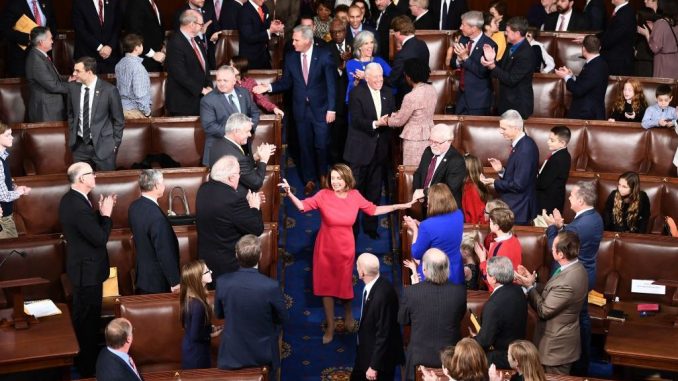

House Speaker Nancy Pelosi (D-Calif.) arrived during the opening session of the 116th Congress at the U.S. Capitol in Washington, DC, January 3, 2019. (Photo by BRENDAN SMIALOWSKI/AFP via Getty Images)
OAN Newsroom
UPDATED 2:10 PM PT – Tuesday, March 2, 2021
The House Rules Committee held a hearing on H.R.1, which looks to link the George Floyd Justice in Policing Act with the For the People Act. While the latter is called the For the People Act, many contend it should actually be called “For the Democrat Party Act.”
This portion of H.R.1 looks to eliminate voter identification laws and make mass mail-in ballot systems federally mandated.
While Congress doesn’t have the authority to dictate how state election commissions run elections, the bill seeks to punish states who require IDs and require mail-in ballots to be requested by voters.

A volunteer for the Independent political party stood outside a polling station waiting to speak to voters in Arlington, Virginia on November 7, 2017. (Photo by ANDREW CABALLERO-REYNOLDS/AFP via Getty Images)
Republicans have argued that the Constitution does not grant Congress that authority.
“The Constitution simply does not permit Congress to mandate these issues, states and localities must be involved, that’s what the Constitution requires,” Rep. Rodney Davis (R-Ill.) stated.
How do they plan to do this? Well, the bill says Congress has the ability to reduce a state’s seats if they break these rules. To put it in simpler terms, the only states with these secure election procedures in place are run by Republicans. Now, Democrats in Congress want to punish these states by taking away their congressional seats.
This is awfully convenient, given that Republicans are likely to take back the House majority in 2022.
“I think the majority needs to rethink what it’s doing here, cloaking a naked and brazen attempt to rig the national election system in one parties favor under the guise of needed reform is simply ridiculous and simply disingenuous,” Rep. Tom Cole (R-Okla.) said.
To justify this possible power grab, the bill calls voter ID, among other things, a form of voter suppression. It argues states implement the rules as a way to keep Black and brown voters from participating in elections.
“States once covered by the Voting Rights Act started to enact barriers to voting, reminiscent of the Jim Crow era,” Rep. Zoe Lofgren (D-Calif.) said.
The idea that voter ID laws repress Black and brown voters stems from a Harvard study, which said minority citizens have a harder time attaining an ID or a drivers license. As a result, Republican states who require ID are keeping them from casting ballots.
What Democrats failed to mention is that these laws effect Democrats and Republicans equally, because older conservatives who no longer drive often don’t have a drivers license either. Altogether, similar studies found voter ID laws negatively impact both Democrat and Republican votes, with Nate Silver’s FiveThirtyEight estimating the overall impact on voter turnout is no more than two percent.

NEW YORK, NY – SEPTEMBER 30: FiveThirtyEight Politics Editor Michah Cohen, FiveThirtyEight Statistician, Author and Founder Nate Silver, and FiveThirtyEight Senior Political Writer and Analyst Harry Enten spoke onstage at the Nate Silver and FiveThirtyEight: The Election Playoff Preview panel presented by ESPN during Advertising Week 2015 AWXII at Nasdaq MarketSite on September 30, 2015 in New York City. (Photo by Andrew Toth/Getty Images for AWXII)
Democrats are also taking aim at the 14th Amendment as a way to take congressional seats away from Republican states.
The bill wants to use Section 5 of the 14th Amendment, which gives Congress the power to enforce the rules of the amendment, to alter Section 2 of the 14th Amendment.
While Section 2 gives states a number of congressional seats based on population, this bill seeks to give Congress “additional authority to reduce a state’s representation in Congress when the right to vote is denied.”
Republicans now argue if this bill is passed, it will effectively make voter ID laws unconstitutional. As a result, there will be no way to confirm if a voter is who they say they are and ensure everyone who votes, only votes once.
In addition, a Morning Consult poll found 15 percent of Republicans are now less motivated to vote in future elections because of election integrity concerns during the 2020 presidential race.
If this bill is passed, eliminating election integrity requirements like voter ID, it would effectively suppress Republicans in far greater numbers than any voter ID law ever possibly could.






Be the first to comment